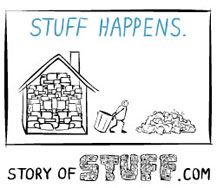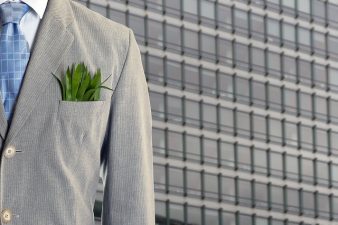 In order to change our unending addiction to Stuff, we need to redefine progress. We need to realize Stuff doesn’t make us happy.
In order to change our unending addiction to Stuff, we need to redefine progress. We need to realize Stuff doesn’t make us happy.
The Story of Stuff is subtitled “How our obsession with stuff is trashing the planet, our communities, and our health – and a vision for change.” Its author, Annie Leonard, is not anti-stuff but she explains that, “I want us to value our stuff more to care for it, to give it the respect it deserves. I want us to recognize that each thing we buy involved all sorts of resources and labor.” Leonard describes Stuff as “manufactured or mass-produced goods, including packaging.” Hence, this book is all about “Stuff we buy, maintain, lose, break, replace, stress about, and with which we confuse our personal self-worth.”
Stuff is a global problem
Annie Leonard is an expert in sustainability and environmental health issues. She has campaigned and investigated factories and waste disposal systems for over twenty years, working with groups such as Greenpeace International and the Global Anti-Incinerator Alliance.
She writes from her own perspective as a US citizen, but makes it clear that stuff is a global problem, in its construction, consumption and its disposal. She gives numerous examples of how these things are interconnected across the world. When the richest 20% of the world’s population are responsible for over 75% of its consumption and the world’s poorest 20% responsible for less than 2% then there is plenty of scope for some global redistribution of Stuff.
This book is not a guide to living a greener life, although Leonard does provide some ideas for individual actions. Rather, it is a critique of the dogma of economic growth, capitalism and above all, consumerism and over-consumption. It contains five main chapters that cover the life cycle of every product we use in our our homes and our lives namely: Extraction, Production, Distribution, Consumption and Disposal.
Extraction often involves the destruction of whole landscapes to obtain minute quantities of ore from tonnes of rock. The horror stories in Production include the former Union Carbide factory in Bhopal. Leonard argues fiercely that if any industrial process is too toxic for communities in the developed world then it should also be banned in the developing world.
In Distribution there is discussion of the local food movement, a hopeful trend to reduce food miles and invest in local communities.
In Consumption she considers some of the reasons we seek to acquire stuff beyond our real needs. Unfortunately, she concludes, “Stuff doesn’t make us happy,” and focuses on advertising and planned obsolescence as devices that have promoted unnecessary consumption.
In Disposal Leonard concentrates on the need for systemic changes, often requiring input at the production stage. Such changes might include the introduction of returnable containers, reducing packaging waste, composting, designing modular and upgradable electronics products. Leonard argues that incineration is easily as bad as landfill.
Exporting toxic stuff
Exporting our toxic waste to other countries in the guise of recycling is not the answer either. Leonard recounts the story of the Khian Sea, a ship which set out carrying incinerator ash from Philadelphia and dumped some in Haiti under the guise of importing ‘fertilizer.’ It went on to spend twenty-seven months at sea in a desperate search for somewhere to unload its toxic cargo, finally dumping it illegally in mid ocean.
Leonard is realistic in this book about how complex it is to make changes and how the choices are not always straightforward. She champions political and community engagement, believing that it is not enough for people to simply recycle, particularly if waste goods are simply ‘downcycled’ in the production chain, so that new raw materials are still needed to replace the original products. She argues that there must be full-scale system changes.
Low impact choice
Society needs to change so that the default action is a low impact choice. In the book’s epilogue she suggests four major paradigm shifts that need to take place, shifts which would “lay the groundwork for creating an ecologically compatible life on earth – life with greater happiness, greater equity and for many of us, less polluting, wasteful, cluttering stuff.”
According to Annie Leonard, we need to redefine progress (away from GDP as the main measure of how well a country is doing), do away with war (which costs governments so much and prevents them doing more worthwhile things) and internalize externalities (by making producers pay the full cost of the damage they do to the environment and societies). Finally, we need to “value time over Stuff”.
The Story of Stuff provides ample information for those campaigning for such changes. Although there are moments when her arguments sound borderline obsessive, for example when writing about the evils of some products such as PVC, she also offers resources to back up her revulsion (www.besafenet.com/pvc/).
More resources
And ultimately, it is her passionate belief in the need for change which drives this book. Leonard writes, “take an inventory of your interests, passions, and skills and then look out in the world and see which organizations are a good match.” There are a vast number of useful online resources to be gleaned from this book, many of them international in their remit. To give you some ideas, they include the following:
- Wiser Earth http://www.wiserearth.org/
- Freecycle http://www.freecycle.org
- Happy Planet Index http://www.happyplanetindex.org
- Earth Rights International http://www.earthrights.org/
- Human Rights Watch http://www.hrw.org/
- Good Guide http:www.goodguide.com
- Global Alliance for Incinerator Alternatives http://www.no-burn.org/
- Toxics Use Reduction Institute http://www.turi.org/
- Clean Production Action http://www.cleanproduction.org
- Green Science Policy Institute http://www.greensciencepolicy.org
- Rainforest Action Network http://ran.org/
- End Mountaintop Removal http://www.ilovemountains.org/
“There’s so much work to be done in over-hauling our current systems that it doesn’t really matter which issue you choose; what matters is that the work is done towards the broader goal of a sustainable and just world for everyone.”
If you enjoy The Story of Stuff then you might also want to read Fred Pearce’s Confessions of an Eco Sinner which covers some very similar territory but has more in depth personal case histories tracking down where his stuff comes from and where it goes to.
If you’re into the practicalities and politics of human waste and sanitation then Rose George’s Book The Big Necessity is a compelling read. Annie Leonard’s own The Story of Cosmetics has just been launched and is available at her website http://www.storyofstuff.com/ where you can also see the original film that led to the writing of The Story of Stuff.
Reviewer Pauline Masurel is a gardener and writer who lives in the United Kingdom, near Bristol. She is a regular reviewer of fiction for The Short Review website and has reviewed books for Amateur Gardening magazine. Her own short stories have been published in anthologies, broadcast on BBC radio and featured online. She was a runner up in the 2010 Chapter One International Short Story competition and is a member of the storytelling group Heads & Tales. More about her own writing can be found on her website www.unfurling.net.
More Book Reviews:





This review is all well and good but it ignores the driving force :human population growth.
None of the measures discussed above will have any significant or lasting effect if no attempt is made-worldwide-to curb human expansion.